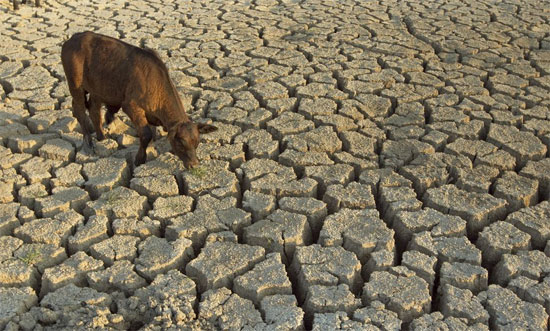Climate change 'attacks' the Volta delta
The Volta Delta, located in West Africa, home to 24 million people in six "Black continent" countries, will become a region heavily affected by climate change as water resources are shrinking. move to many hydropower projects and irrigation systems.
According to a joint report by scientists from the International Water Management Institute, Ghana's Research Council for Industry and Science and the Institute for the Study of Potsdam Influence in Germany, water sources in the Volta Delta region may decrease by 24% by 2050 and 45% by 2100 when the average temperature of this area is expected to increase by 3.6 degrees by the end of this century.

Photo: statesman.com
One of the biggest risks is the shrinking water resources that will impact hydropower projects, particularly the Akosomo Giant Dam , creating Lake Volta, the largest artificial lake and the fourth largest reservoir. on the world.
In addition to the environmental consequences, depleted water sources will cause hydropower projects to operate at only 52% of capacity by 2050 and by 2100, this figure is only about 28%.
Similarly, the irrigation system will only provide 75% of the annual irrigation water demand by 2050 and will only have enough water to meet 32% by 2100.
To avoid possible damage, report calling for six countries in the Volta Delta region, including Ghana, Burkina Faso, Benin, Cote d'Ivoire, Mali and Togo, to strengthen renewable fuel sources, including wind and solar energy.
In addition to water storage solutions, scientists propose solutions to build rural aquifers to bring water from rivers or reservoirs. This is one of the techniques of water taking that is being used more and more in drought areas.
- The Mekong Delta risks being submerged under the sea
- Vietnam is supported to adapt to climate change
- Climate change: Vietnam is affected
- Denmark helps Vietnam cope with climate change
- Impact of climate change on rice granary: Do not be pessimistic
- Climate change scenario: More than 1/3 of the Mekong Delta is flooded
- Losing 40% of the Mekong Delta if the sea level rises by one meter
- The whole Mekong Delta is subsiding at a rate of nearly 2.5cm per year
- US launches satellite tracking climate change
- This is how Dubai copes with climate change
- What is Climate Change?
- The mysterious attacks of sharks
 Is the magnetic North Pole shift dangerous to humanity?
Is the magnetic North Pole shift dangerous to humanity? Washington legalizes the recycling of human bodies into fertilizer
Washington legalizes the recycling of human bodies into fertilizer Lightning stone - the mysterious guest
Lightning stone - the mysterious guest Stunned by the mysterious sunset, strange appearance
Stunned by the mysterious sunset, strange appearance